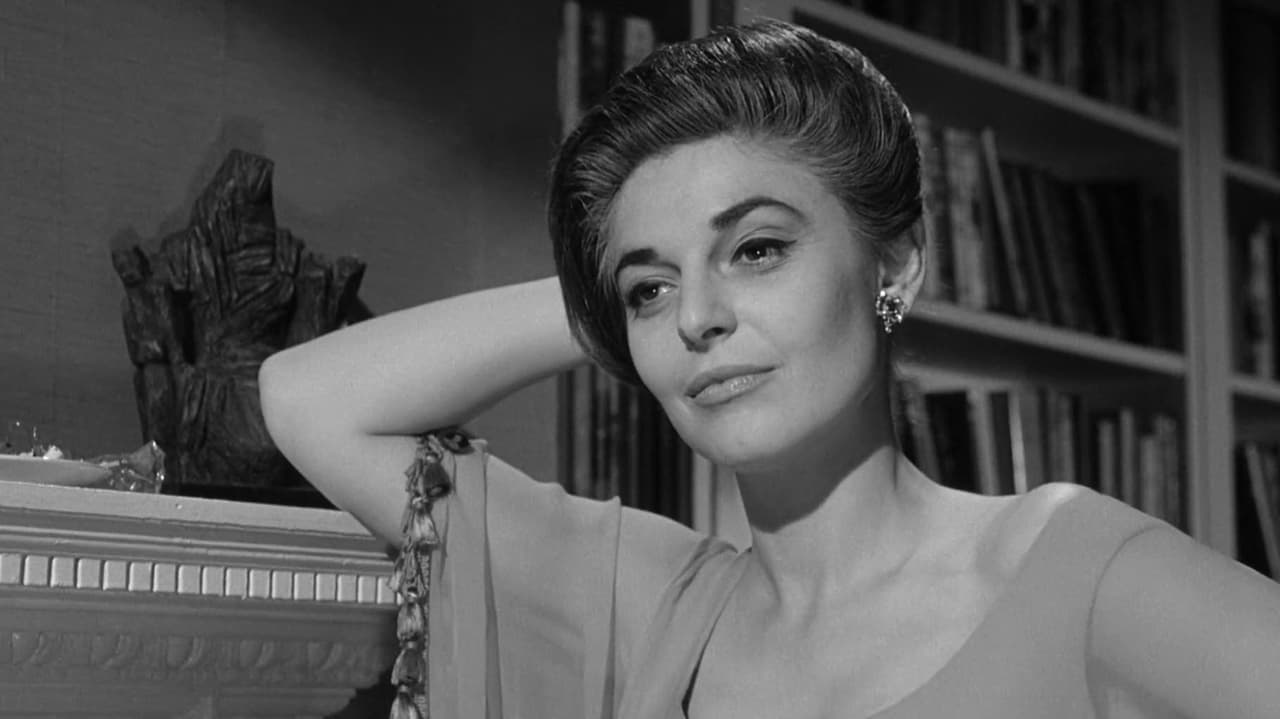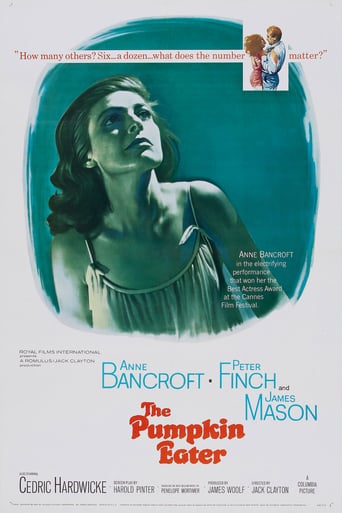

The Pumpkin Eater, for which Ann Bancroft won a Golden Globe and received her second Best Actress Oscar nomination, is an example of how she could dramatically dominate a film. This film, based on Penelope Mortimer's novel, is energized by Harold Pinter's enigmatic screenplay, beautifully photographed by Oswald Morris, and expertly directed by Jack Clayton. Peter Finch, James Mason, and Maggie Smith, round out a great cast. As the film opens we see a well-dressed, but extremely depressed woman, Jo Armitage (Ann Bancroft), entering her house. She seems totally alone. Her isolation is apparent as she lets a telephone ring without answering it. As she looks out from her lofty tower (an old Dutch-style windmill, without its blade-like arms, that had been restored as part of her house), we see a split screen (double exposure) showing us her thoughts from the time when she first met her husband, Jake (Peter Finch). This split screen cues us into a flashback that will make up the bulk of the film. I love this shot because it simulanteouly shows us Jo's present- day depression (shown on our left side) and blends it with images of the formerly happy and laughing Jo (shown on our right side). Not only is there chiaroscuro in the image but there is also chiaroscuro when one compares Jo's present mood with that of her past.As we enter the flashback, we see Jo living in a restored barn with her second husband, Giles (Richard Johnson), and her seven children. There, she meets one of Giles' friends, Jake Armitage (Peter Finch). She eventually leaves Giles for Jake. He marries her in spite of her brood of children, accepting both the 'zoo and the zookeeper' as her father, Cedric Hardwicke, puts it. Jo's father wants to give Jake a 'fighting chance' of succeeding, so he offers to pay for having the two eldest sons shipped off to boarding school and putting a deposit down on a modest London flat for Jake and his ready-made family. As Jo becomes pregnant with Jake's child, he goes on to become a successful and wealthy film writer. Since his work takes up much of his time, Jo becomes empty and unhappy. Jake asks one of his co-workers, Philpott (Maggie Smith), to live with them for a while and help Jo in caring for the children. But, Philpott is not much help, and Jo doesn't understand why she is staying with them. After Jo accuses Jake of having an affair with Philpott, Philpott leaves them. Also, Jo doesn't feel comfortable with Jake's film-related crowd and stays home with the children rather than accompanying him to filming locations or going to the required social parties. Jo wants Jake to herself, but that isn't possible with his work; Jake 'n Jo continue to co-exist in quiet desperation. One day while shopping at Harrod's, Jo publicly breaks down. Jake has Jo start psychotherapy and she eventually becomes better. The sessions with her psychiatrist, Eric Porter, are revealing, but not overstated in this Pinter screenplay. One evening, Jo decides to invite Jake's working friends to a party. However, she feels alone, isolated, among her own guests. One obnoxious guest at the party is Bob Conway (James Mason). Conway--who declares his distrust of 'professionals' and prefers to be called a 'craftsman'--is married to a film actress, Beth (Janine Gray). The social (professional) link between Beth and Jake is Jake's film writing. When Jo becomes pregnant again, Jake asks her to have an abortion and sterilization. (He wants to someday be free to travel, have fun, and not always be thinking about caring for another new child—to be able to start out all over again). He has Jo's doctors approve the medical procedures based on her psychological and medical condition. Jo learns to live with this until she finds out, from Bob Conway, that HIS wife is pregnant, but not by him—by Jake.Aside from the great acting, directing and photography, I think that this is a very good film in that it is often able to show emotions WITHOUT the use of words. It is not always easy to show what depression actually 'looks like, 'but this film captures it quite well. It also captures isolation, manipulation, and panic in a way that I have never seen done so well before. Priceless!
... View MoreAnne Bancroft gives a shattering performance as a woman on the verge in The Pumpkin Eater. In arguably her finest role Bancroft through the shear power of expression slowly disintegrates from the pressures of raising an army of kids and the betrayal of her philandering husband in this melancholy marathon written by Harold Pinter and directed by Jack Clayton. Prolific breeder Jo marries up and coming screenwriter Jake Armitage and adds another child to the brood along the way. She luxuriates in the chaotic household but Jake chafes at the constant barrage of activity. He is also prone to straying. Watching Bancroft go over the edge is both disturbing and mesmerizing made even more uncomfortable by Jack Clayton and cinematographer Oswald Morris's insistence on making us see things from her point of view most of the film. Her haunting blank stares speak volumes making her rages all the more volcanic. The adult world she deals with is deceitful and cruel and we are left to witness her wall of denial crumbling. It's a grim but absorbing watch.Finch along with a superb supporting cast do an excellent job of illuminating Jo's hostile world. In a mere three scenes and one phone call James Mason goes about as low as one can get as a cuckolded husband with unctuous magnificence. Maggie Smith is exasperatingly callous as a mooch and lover to Jake while Yootha Joyce as a stranger in a benign hair salon is chilling.Over two hours in length this lugubrious work never wanes due to Pinter and Mortimer's fine tuned script that keeps you guessing as to the extent of Jo's instability along with Clayton's tension creating tight framing and Miss Bancroft's truly riveting performances that has to rank with some of the best of the decade.
... View MoreFantastic acting by Anne Bancroft in the lead role (and, as usual, fantastic support by James Mason in the far too few scenes in which he appears) but otherwise quite a haul as the central character descends yet again into a trough of misery and depression (once "in Harrods, of all places!") in the course of two hours (which only seem like ten for the viewer). Good job she had such a good nanny to look after the horde of kiddies and wealthy hubbies busily converting old barns and windmills to please her, otherwise things could really have looked bleak! Well up for a Monty Python-style spoof as the years have passed (not least in terms of the HATS which British ladies were still wearing in the mid ("Swinging" (ha!)) Sixties!)(One aspect of Maggie Thatcher's rule which did leave a lasting positive benefit as she killed off such head coverings for good after looking a complete ------- on television while she still wore them). Worth seeing (once) for Bancroft's great acting or to do some social historical research on Britain in the mid-1960s, but you are not going to emerge from watching this one with a smile on your face, I imagine.
... View MoreThis 1964 film is a perfect definition of a brooding piece. In many scenes, Anne Bancroft looks like she is getting ready to play Mrs. Robinson 3 years later. When she sits with that cigarette in her hand and brooding, I thought of sexual liaisons with Benjamin.The picture is a very dull one. It should have had the title of "The Baby Maker." When Bancroft, on her 3rd marriage, is not manufacturing children, she is emotionally out of it and ready to bust a gut.The story-line here is very little. Women-Lib groups could use this movie to press their demands for women getting out of the house in the 1960s and be economically and sexually liberated.As husband number 3, Peter Finch has little to do except have dalliances with other women.The film desperately needs a burst of excitement and this does not occur.As the emotionally drained woman, Bancroft gives her all in the film and received a well deserved Oscar nomination. Special kudos to James Mason, who briefly appears but etches a character, a snitch whose wife is involved with Finch, totally convincing.
... View More